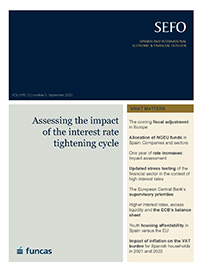Assessing the impact of the interest rate tightening cycle
Fecha: septiembre 2023
SEFO, Spanish and International Economic & Financial Outlook, V. 12 N.º 5 (September 2023)
Index
Whether or not there is a reform of the rules for European macroeconomic policy coordination, policymakers across Europe will need to begin consolidating their fiscal accounts. The high rate of inflation in the wake of the pandemic has eased some of that adjustment burden, but the swift monetary tightening introduced to calm rapid price increases will add to the challenge.
As of December 2022, Spain was not even at the halfway mark as regards allocation of the non-reimbursable component of funds awarded under Next Generation EU (NGEU), as tenders and grants (35.83 billion euros), reached 43.7% of the total assigned to Spain by this point. Given that Spain has until August 2026 to implement the funds, the country will need to accelerate implementation, all the more so considering the additional funds awarded under the June 2023 Addendum.
Monetary policy remains immersed in an intense battle to stem inflation, manifesting itself through a quick succession of interest rate increases and consequently raising eurozone borrowing rates across the board. Credit has already contracted, and the cost of debt has increased, but the duration of the tightening cycle remains unclear as monetary authorities have signalled that their policy approach remains conditional upon the path of inflation.
While European banks are better positioned to offset potential capital depletion via stronger NII generation, the upward shift in the rate curves is impacting the value of the banks’ investment portfolios. Within this context, the stress tests remain a constantly evolving tool capable of adapting to new sources of risk, such as climate, cybersecurity, geopolitical and pandemic risks, that are not captured in scenarios that only consider stressed financial conditions but can still wreak havoc on the economy and, by extension, the banking system.
The shift in the macroeconomic environment facing the financial sector and the attendant switch in monetary policy tack, together with the recent episodes of financial turbulence in a number of markets, have strengthened the European Central Bank’s resolve to reinforce the resilience of the European banking system. Despite the current environment’s risks, through an assessment of the ECB’s supervisory priorities, recent findings support the strength and adaptability of the European banking sector, so mitigating the probability of future episodes of financial turbulence, such as those observed in other regions.
Although the ultimate price stability target has not changed and overnight interest rates remain the channel for policy transmission to the economy, the ECB’s balance sheet has taken on greater purpose relative to its traditional role as a support instrument for monetary policy. Against this backdrop, with the ECB now embarked on the path of policy “normalisation”, it is timely to assess whether it is possible to return to the way things were before 2007, given that excess liquidity is determined by factors exogenous to monetary policy and can coexist with it indefinitely, even if policy is restrictive, as it is today.
Spanish youth face significantly more difficulties accessing affordable housing than is the case in other European countries –a situation which has worsened in recent years. The main factor appears to be the shortage of rental housing, suggesting that policies should be geared towards promoting supply in that segment of the market, rather than acting in an untargeted manner or supporting demand.
Value added tax (VAT) receipts soared in 2021 and 2022, by 14.9% and 13.4%, respectively, according to the Spanish tax authority (AEAT, 2023). An analysis of the increase in the VAT borne by households those years and how much of the increase is attributable exclusively to the inflation phenomenon shows that Spanish households’ total VAT burden increased by 263.6 euros on average in 2022, of which 138.2 euros (52.4%) is directly attributable to inflation.

